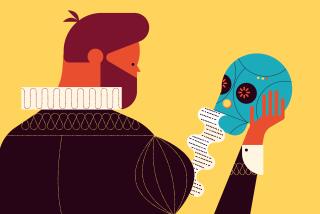Computers Redefining Publishing
- Share via
It’s “deadly dull and serious,” conceded Harold Evans, the publisher of Random House, but in 1994, publishers will be “putting on our electronic skates.”
What this means, for an industry devoted to words written on paper, is learning to love the CD-ROM. It means making peace with the possibility of “books” the size of a credit card. It means contracts that tell writers--notoriously an obstreperous lot--to submit their manuscripts on computer disks.
Curiouser and curiouser, say those who had secretly hoped the information superhighway might bypass their neighborhood. “It’s a bit as if we suddenly had to catch up with the nuclear age,” said John Sterling, editor in chief of Houghton Mifflin in New York.
The electronic reckoning raises the question of precisely what a writer creates. Once created, who owns “the work,” as most contracts refer to any literary endeavor? How do writers and their publishers divvy up the rights to future technological adaptations? Who bears the cost of producing electronic editions? How are they safeguarded?
“All kinds of notions about what publishing is or is not are beginning to break down,” Sterling said. “There’s a real sense that the business just can’t continue in its present mode. The old and familiar ways of doing business are just not good enough.”
One great concern is that electronic wizardry will somehow make reading obsolete. Curling up with a hand-held computer is just not the same as flipping the pages of a beloved book.
But Evans said the unscientific research he has done in his living room suggests otherwise. His two young children, Evans said, spend hours with the animated-for-computer children’s “books” that Random House has developed with Broderbund, a German publisher.
“My experience is that the kids, having played with the Berenstain Bears, want to go back to the book,” Evans said.
Meanwhile, the factions within publishing that are not expressing terror at the electronic incursion are voicing hope that technological innovations will jolt the industry out of what many see as its current complacency.
“People have this frustration with, and despair about, the traditional publishing business,” Sterling said. “There’s a real concern that the way publishing has worked in the past is just not working anymore. And there’s a hope that electronic publishing is going to be a panacea.”
But so much of the electronic buzz continues to remain incomprehensible, even to those spreading it.
“The wonderful thing is, you can say almost anything, and nobody knows if you’re wrong,” Evans said.
More to Read
Sign up for our Book Club newsletter
Get the latest news, events and more from the Los Angeles Times Book Club, and help us get L.A. reading and talking.
You may occasionally receive promotional content from the Los Angeles Times.










